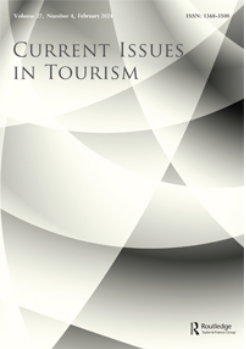Born in a tour guide’s family: how can tourism employment fuel intergenerational social mobility?
IF 4.6
3区 管理学
Q1 HOSPITALITY, LEISURE, SPORT & TOURISM
引用次数: 0
Abstract
ABSTRACTStudying social mobility can help understand societal development and changes, but it is lacking in nowadays tourism research. Focusing on tour guides, the present paper concerns how tourism employment affects intergenerational social mobility. We interviewed 22 tour guide families in Wulingyuan, China, where tourism has been the main economic driver for over 40 years. Drawing on the concept of capital with thematic analysis, we found that tour guide as a job (1) enables household economic growth (2) enlarges household social capital with networks of tourism associates and valuable customers, (3) cultivates individual cultural capital growth through at-work knowledge acquisition, skill development, and vision expansion, and (4) jointly improves individual symbolic capital in mianzi accumulation (higher social status). Some of the capital can be transferred to their offspring, which fosters an upward intergenerational social mobile trend. The key to successful transfer is parenting. The present study contributes to studies of tourism development and societal growth, highlights the advantages of frontline tourism jobs in promoting long-term growth for both the practitioners and their families, and pinpoints critical factors behind such long-term growth. Theoretical, practical and policy implications are accordingly discussed.KEYWORDS: Intergenerational social mobilitytourism labourtourism employmenttour guidecapitalsustainable tourism development AcknowledgementWe would like to thank Xinru Jiang, Zishuai Li, and Xingzi Zheng for their help in data collection.Disclosure statementNo potential conflict of interest was reported by the author(s).Additional informationFundingThis research is funded by The National Natural Science Foundation of China, project 42071181.出生在导游家庭:旅游业就业如何促进代际社会流动?
摘要对社会流动的研究有助于理解社会的发展和变化,但在旅游研究中存在一定的不足。本文以导游为研究对象,探讨旅游就业对代际社会流动的影响。我们采访了中国武陵源的22个导游家庭。40多年来,旅游业一直是武陵源的主要经济驱动力。通过对资本概念的主题分析,我们发现导游作为一种职业(1)促进家庭经济增长;(2)通过旅游伙伴和有价值客户网络扩大家庭社会资本;(3)通过工作中的知识获取、技能发展和视野拓展培养个人文化资本增长;(4)共同提高个人面子积累的象征资本(更高的社会地位)。一些资本可以转移给他们的后代,这促进了一种向上的代际社会流动趋势。成功转移的关键是养育。本研究有助于旅游业发展和社会增长的研究,突出了一线旅游工作在促进从业者及其家庭长期增长方面的优势,并指出了这种长期增长背后的关键因素。本文对理论、实践和政策影响进行了相应的讨论。关键词:代际社会流动旅游劳动力旅游就业导游资本旅游可持续发展致谢感谢蒋心如李子帅郑星子对数据收集的帮助披露声明作者未报告潜在的利益冲突。本研究资助国家自然科学基金项目(42071181)。
本文章由计算机程序翻译,如有差异,请以英文原文为准。
求助全文
约1分钟内获得全文
求助全文
来源期刊

Current Issues in Tourism
HOSPITALITY, LEISURE, SPORT & TOURISM-
CiteScore
15.50
自引率
10.00%
发文量
230
期刊介绍:
Journal metrics are valuable for readers and authors in selecting a publication venue. However, it's crucial to understand that relying on any single metric provides only a partial perspective on a journal's quality and impact. Recognizing the limitations of each metric is essential, and they should never be considered in isolation. Instead, metrics should complement qualitative reviews, serving as a supportive tool rather than a replacement. This approach ensures a more comprehensive evaluation of a journal's overall quality and significance, as exemplified in Current Issues in Tourism.
 求助内容:
求助内容: 应助结果提醒方式:
应助结果提醒方式:


